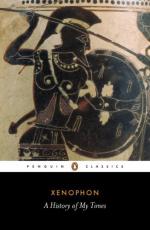
|
| Name: _________________________ | Period: ___________________ |
This test consists of 15 multiple choice questions and 5 short answer questions.
Multiple Choice Questions
1. What caused the status of Athens to change?
(a) A lack of military.
(b) Poor leadership.
(c) A lack of laws.
(d) A civil war.
2. What was the reason for the Spartans' animal sacrifice?
(a) Bad weather.
(b) To serve as a warning.
(c) To celebrate.
(d) War.
3. How many days should the command be rotated between Athens and Sparta, according to Procles?
(a) Two.
(b) Five.
(c) Three.
(d) Four.
4. What Spartan soldier served as a diplomat for peace between the cities of Greece?
(a) Brasidas.
(b) Leonidas.
(c) Cleandridas.
(d) Antalcidas.
5. What was the strength of Athens as it prepared to enter into an alliance with Sparta?
(a) The battles at sea.
(b) The battles on land.
(c) Political action.
(d) Creating laws.
6. Where was the peace conference held at the end of the book?
(a) Delphi.
(b) Olympia.
(c) Sparta.
(d) Athens.
7. Which subdivision of Greece was raided as a result of a leader's invitation?
(a) Thessaly.
(b) Crete.
(c) Attica.
(d) Epirus.
8. What did the Spartans do with Polydamas after they handled his request?
(a) They asked him to join their army.
(b) They sent him away.
(c) They complimented him.
(d) They ridiculed him.
9. What did Procles acknowledge in his speech?
(a) Athens was unable to defeat Sparta.
(b) Athens has never feared Sparta.
(c) Sparta was unable to defeat Athens.
(d) Sparta has never feared Athens.
10. How is augury defined?
(a) Predicting a natural disaster.
(b) Reading the stars.
(c) Predicting the weather.
(d) Reading omens.
11. When did the Spartans make their animal sacrifice?
(a) Before engaging the enemy.
(b) After the death of someone.
(c) After a battle.
(d) Before a bad storm.
12. How weak did Jason think the King of Persia really was?
(a) Just as weak as the opposition thought.
(b) Weaker than the opposition thought.
(c) Not as weak as the opposition thought.
(d) He did not comment on the weakness.
13. Who conducted the raid in the second story of Book 2, Chapter 5?
(a) Teleutias.
(b) Iphicrates.
(c) Lysander.
(d) Conon.
14. How many men are discussing the idea of marriage in Book 2, Chapter 4?
(a) Three.
(b) Four.
(c) Five.
(d) Two.
15. How is a woman's willingness to marry mentioned in the book?
(a) There is no mention of it.
(b) There are many pages dedicated to it.
(c) There is some mention of it.
(d) It is only mentioned as a definition for another term.
Short Answer Questions
1. In Xenophon's story, what prompted an invitation for a raid?
2. As depicted in Book 2, Chapter 5, what can the actions of one leader affect?
3. How often did Polydamas test his men?
4. How did Sparta respond to the request for help from Phocis?
5. How was Procles' speech received?
|
This section contains 455 words (approx. 2 pages at 300 words per page) |

|




